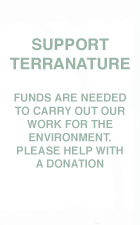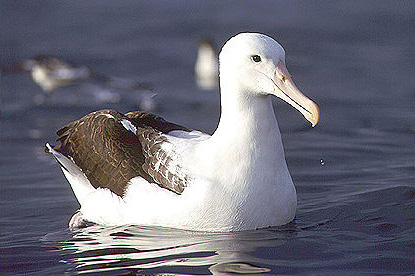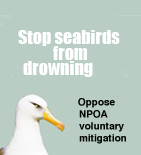 |
 |
 |
 |
 |
 |
 |
 |
 |
 |
 |
| Deep-sea fisheries |
| Genetic modification |
| Global warming |
| Miscellaneous topics |
| Native species control |
| Seabird protection |
 |

|
|
|
The comments presented are from interested people wishing to express their views, pass on information, and participate in discussion on various environmental issues. Their comments are not necessarily the opinion of TerraNature, and may not represent a position TerraNature takes. |
|
 |
Seabird protection Related TerraNature Article: |
|
I have to give in to the temptation to say to David Benson-Pope - we told you so.
I do not know whether to congratulate the Minister on taking action, or to chew him out for
taking so long to discover that fisherman are just as dishonest as everyone else.
Anyway, thank you Minister, but for goodness sake go after the rest of them. Thanks to TerraNature for making us aware of the latest fishing issue in the article
"Voluntary action fails to save seabirds". It feels good to be so right for once,
after telling the Ministers of Fisheries and Conservation last year, that relying on the
honesty of the fishing industry in taking voluntary preventive measures to stop the killing
of seabirds would not work. Now that they have got the message loud and clear, from the
fishers themselves no less, we can only hope that the Minister will quickly take stronger
action throughout all fisheries. |
|
 |
Seabird protection Related TerraNature Article: |
|
When the Minister of Fisheries notified squid fishers that their quota in the Southern Ocean would be increased from 44,000 to 57,000 tonnes, he told them to reduce bycatch of endangered seabirds. Telling the fishing industry means bugger all. The Minister must put observers on fishing boats to make sure they take mitigating measures. It is time to stop asking the fishing industry nicely to stop killing albatross, and get on with making them. Michael Jones, Hamilton 23 May 2004 The collaboration of the Ministry of Fisheries and the Department of Conservation with the fishing industry through the Southern Seabird Solutions Trust is a conflict of interest, as the Ministry currently investigates the alleged misreporting of fish catch from five fishing companies. The SSS Trust was formed to promote voluntary mitigation measures by longline fishers to prevent seabird bycatch. The Trust conflicts with the government's ability to enforce fishing laws and regulations. This method of working with industry is no different than forming a trust that has the defendant and the prosecutor in a criminal case as trustees. It is necessary for the Ministry of Fisheries to separate itself from all matters involving the fishing companies it is obligated to regulate. Carly Simmons, Wellington 18 February 2004 I was pleased to see in NZ Herald articles on February 12th and 13th that Ministry of
Fisheries officials seized two Tauranga fishing boats, and documents from the offices of
Sealord in Nelson, Nelson Fisheries in Wellington, and Matariki, Tawera Fishing Company
and Pelco NZ in Tauranga. The companies are being investigated for misreporting
fish catches and operating without licences. This comes just after another seizure of
a foreign vessel in Christchurch for misreporting catch. It is not good that this
is going on, but it comes as no surprise. It is good to see Ministry officials
cracking down on quota violations, but where are they when it comes to killing albatross
and petrel? These are companies in an industry that the Ministry of Fisheries is
giving a free hand to self impose seabird bycatch mitigation measures. Can fishing
companies be trusted? It does not look like it. I must correct my December 10 comment. There are New Zealand statutes against killing seabirds at sea. The Wildlife Act 1953 states "...'Hunt or kill' in relation to any wildlife, includes the hunting, killing, trapping, or capturing of any wildlife by any means ..." The Ministry of Fisheries and the Department of Conservation just seem to be unwilling to enforce the law. The Minister of Fisheries has himself stated "... New Zealand is an important breeding ground for approximately 80 seabird species and the greatest variety of albatross and petrel species in the world. Most of these birds are absolutely protected under the Wildlife Act, which means it is an offence to hunt or kill them. Sadly, one of the key threats facing many seabirds is not hunting but the unintentional damage done by commercial fishing ..." There is a strong argument that killing is intentional when fishers know the birds are present, and know the deadly baited hooks they set will attract them. Intent to kill is further shown when the act is repeated, and when known prevention measures are not used. Peter Callum, Wellington 27 December 2003 Committees, commissions, and so forth have long been used by government to deflect
attention from difficult issues, to give the appearance that something is being done
when actually it isn't, or to buy time. Forming a charitable trust to perform a
government function is a new one. The Southern Seabird Solutions Trust is doing
more than advising. It is acting. When the next election comes around, I
must remember to ask my local Member of Parliament candidate what charitable trusts will
be acting on behalf of the government, and if we can vote for the trusts. In his speech to the first meeting of the Southern Seabird Solutions Trust (SSS)
in Auckland, the Minister of Fisheries, Pete Hodgson, made glowing remarks of the
achievements of the new trust during its first year (before it was a trust). These
achievements published in a
November 9 Mfish press release, are copied from the Department
of Conservation web page devoted to SSS. It is interesting to see Mr Hodgson speaking
as if he was not part of SSS when he obviously has been involved with forming it, and to
see the government doing its own spin work on the trust it formed. The Minister said
that DoC and MFish support of the Trust "... properly reflects the Department's role as
a conservation advocate and the Ministry's obligation to avoid any conflict with its role
as regulator and enforcer of fisheries laws and regulations ..." The SSS Trust,
which is ignoring regulation, is in conflict with the Ministry of Fisheries'
role to regulate. By participating in the Trust, the government is in effect
collaborating with the industry it should be regulating. On each day spent messing
about researching new mitigation methods, proven methods are not being used to stop about
25 seabirds being killed in New Zealand waters. The Department of Conservation has found another way to avoid regulating fishing
practices by founding and funding the Southern Seabird Solutions Trust, which is also
supported by the Ministry of Fisheries. According to
DoC's web page on the Trust,
Southern Seabird Solutions has representation from fishers and fishing industry
representatives, government departments, environmental groups (World Wildlife Fund),
ecotourism operators, seabird ecologists, indigenous fisheries interests and others.
The Trust has good objectives for various actions to reduce seabird bycatch, but does not
promote regulated requirements of fishers. Is this government supported Trust not
in conflict with the government's job to govern through laws? We are a nation of
laws. They are not needed for the fishing companies that act to avoid
killing seabirds. They are necessary for the few that will not. The Ministry of Fisheries has let itself get caught in the middle of protecting one of
the most amazing birds on the planet, and protecting the commercial interests of the
fishing industry. It is a sorry state of affairs when government is afraid to
govern. There are laws against killing humans anywhere, and killing native birds
on land, but there are no laws for killing birds at sea. I no longer buy New Zealand seafood because I will not support the destructive
fishing practices that are allowed in the New Zealand fishery. Approval of the Auckland Islands Marine Reserve, New Zealand's largest (484,000 hectares)
and the only subantarctic reserve, by the Minister of Conservation in January 2003,
is an excellent conservation action that will help protect albatross. Unfortunately
it is counterproductive that DOC appears to be taking a back seat on the issue of mitigation
measures for seabird protection from longline fishing.
|
|
 |
 |
  |

 Voluntary action fails to save seabirds
Voluntary action fails to save seabirds Return to have your say ... comments directory
Return to have your say ... comments directory
